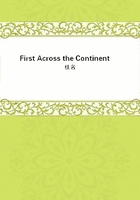
第8章
Above Council Bluffs the explorers found the banks of the river to be high and bluffy, and on one of the highlands which they passed they saw the burial-place of Blackbird, one of the great men of the Mahars, or Omahas, who had died of small-pox. A mound, twelve feet in diameter and six feet high, had been raised over the grave, and on a tall pole at the summit the party fixed a flag of red, white, and blue.
The place was regarded as sacred by the Omahas, who kept the dead chieftain well supplied with provisions. The small-pox had caused great mortality among the Indians; and a few years before the white men's visit, when the fell disease had destroyed four hundred men, with a due proportion of women and children, the survivors burned their village and fled.
"They had been a military and powerful people; but when these warriors saw their strength wasting before a malady which they could not resist, their frenzy was extreme; they burned their village, and many of them put to death their wives and children, to save them from so cruel an affliction, and that all might go together to some better country."
In Omaha, or Mahar Creek, the explorers made their first experiment in dragging the stream for fish. With a drag of willows, loaded with stones, they succeeded in catching a great variety of fine fish, over three hundred at one haul, and eight hundred at another.
These were pike, bass, salmon-trout, catfish, buffalo fish, perch, and a species of shrimp, all of which proved an acceptable addition to their usual flesh bill-of-fare.
Desiring to call in some of the surrounding Indian tribes, they here set fire to the dry prairie grass, that being the customary signal for a meeting of different bands of roving peoples.
In the afternoon of August 18, a party of Ottoes, headed by Little Thief and Big Horse, came in, with six other chiefs and a French interpreter.
The journal says:--"We met them under a shade, and after they had finished a repast with which we supplied them, we inquired into the origin of the war between them and the Mahas, which they related with great frankness. It seems that two of the Missouris went to the Mahas to steal horses, but were detected and killed; the Ottoes and Missouris thought themselves bound to avenge their companions, and the whole nations were at last obliged to share in the dispute.
They are also in fear of a war from the Pawnees, whose village they entered this summer, while the inhabitants were hunting, and stole their corn.
This ingenuous confession did not make us the less desirous of negotiating a peace for them; but no Indians have as yet been attracted by our fire.
The evening was closed by a dance; and the next day, the chiefs and warriors being assembled at ten o'clock, we explained the speech we had already sent from the Council Bluffs, and renewed our advice.
They all replied in turn, and the presents were then distributed.
We exchanged the small medal we had formerly given to the Big Horse for one of the same size with that of Little Thief: we also gave a small medal to a third chief, and a kind of certificate or letter of acknowledgment to five of the warriors expressive of our favor and their good intentions.
One of them, dissatisfied, returned us the certificate; but the chief, fearful of our being offended, begged that it might be restored to him; this we declined, and rebuked them severely for having in view mere traffic instead of peace with their neighbors. This displeased them at first; but they at length all petitioned that it should be given to the warrior, who then came forward and made an apology to us; we then delivered it to the chief to be given to the most worthy, and he bestowed it on the same warrior, whose name was Great Blue Eyes. After a more substantial present of small articles and tobacco, the council was ended with a dram to the Indians. In the evening we exhibited different objects of curiosity, and particularly the air-gun, which gave them great surprise. Those people are almost naked, having no covering except a sort of breech-cloth round the middle, with a loose blanket or buffalo robe, painted, thrown over them.
The names of these warriors, besides those already mentioned, were Karkapaha, or Crow's Head, and Nenasawa, or Black Cat, Missouris; and Sananona, or Iron Eyes, Neswaunja, or Big Ox, Stageaunja, or Big Blue Eyes, and Wasashaco, or Brave Man, all Ottoes."